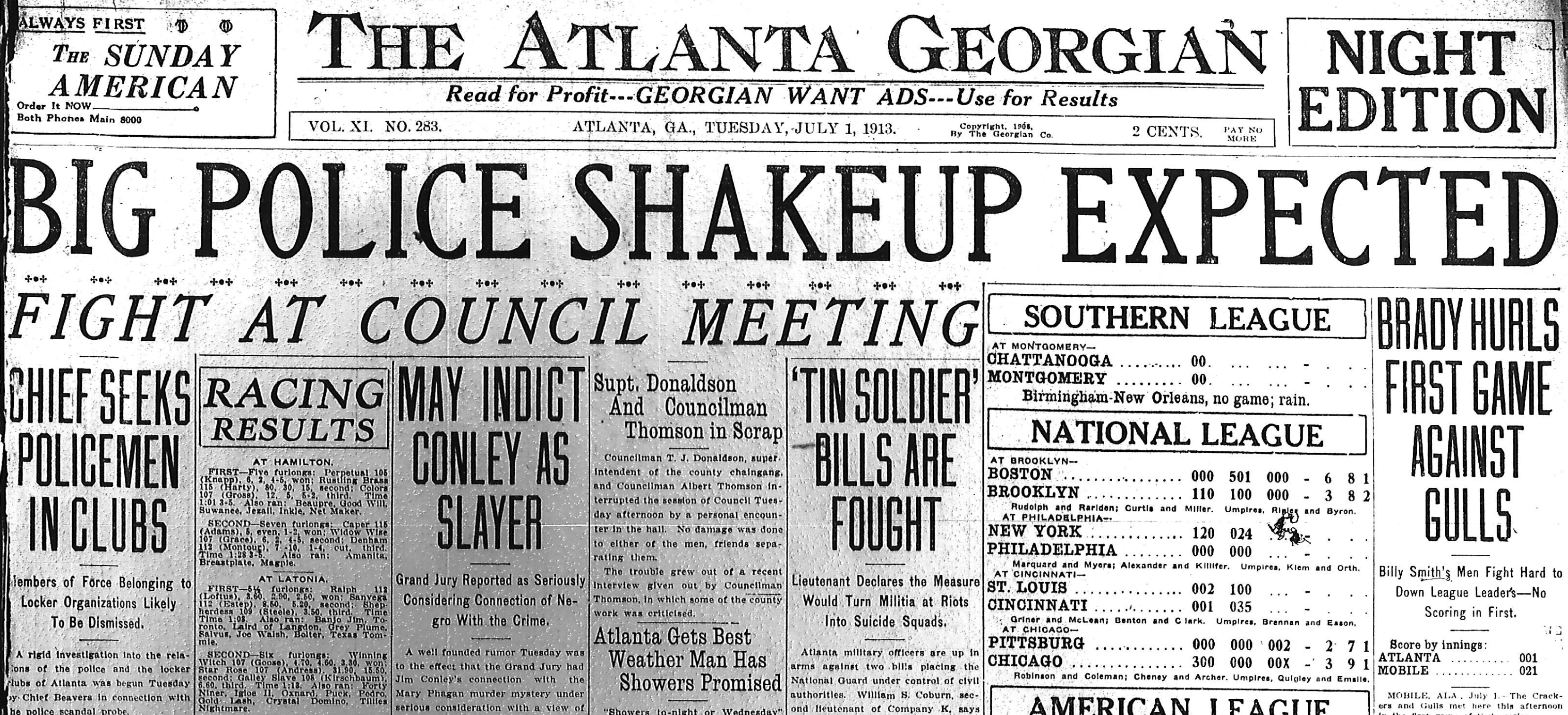 Another in our series of new transcriptions of contemporary articles on the Leo Frank case.
Another in our series of new transcriptions of contemporary articles on the Leo Frank case.
The Atlanta Georgian
Tuesday, July 1, 1913
Grand Jury Reported as Seriously Considering Connection of Negro With the Crime.
A well founded rumor Tuesday was to the effect that the Grand Jury had Jim Conley’s connection with the Mary Phagan murder mystery under serious consideration with a view of finding an indictment against the negro on the charge of causing the death of the little factory girl.
Announcement was made after the close of Tuesday’s session that the present Grand Jury would hold its last session Wednesday, and it was reported that if action were not taken on Conley’s case before adjournment, recommendations would be left with the next Grand Jury suggesting that the negro’s connection with the crime be rigidly investigated.
If the indictment is returned against the negro it will mean that he will be taken from the custody of the detectives and placed in the Tower. He also will bear a different relation to the case in the future, being a defendant instead of a material witness. Attorneys interested in the case said they had heard nothing of the proposed action by the Grand Jury.
Rumors that Newt Lee, negro night watchman at the National Pencil factory, had made sensational disclosures to his attorney, Bernard L. Chappell, and would be one of the State’s most important witnesses in the trial of Leo M. Frank, were set at rest Tuesday by Mr. Chappell.
The negro’s attorney said after the inquest that he would make no effort to procure the release of Lee, as he believed his client was a vital witness and it would be the wisest plan for him to remain in the protection of the State.
His statements at this time and up to the date of the indictment found against Frank led to the impression that Lee had confided in his lawyer significant circumstances, which he has told neither to the detectives nor to the members of the Coroner’s jury.
Denies Confession Reports.
Mr. Chappell said Tuesday, however, that Lee had told nothing which had not already been published in the newspapers and that he was absolutely certain that the negro had been holding back nothing. The attorney said that until Conley had made his string of affidavits for the detectives he had regarded Lee as one of the most important witnesses the State could produce.
Conley’s entrance into the case, he thought, changed the whole aspect of the mystery and largely eliminated the importance of Lee’s testimony for the reason that its significance on the assumption that Frank was the only person having the opportunity to commit the crime was lost when it became known that Conley also was in the factory and acting suspiciously near the time it is thought the girl was murdered.
Lee’s testimony still remains valuable in the eyes of the attorneys for the prosecution, and the night watchman will be called to add to the long string of circumstantial evidence that will be produced by the State. Solicitor Dorsey regards as highly significant the negro’s story of what happened the Saturday afternoon of the murder.
Two Sides of Phone Incident.
One of the circumstances that the State considers suspicious is that Newt Lee found the door leading from the second floor down to the first closed and locked. It had been his experience, he has testified, that Frank, when in the ebuilding [sic] alone, would lock the street door, but leave the door between the two floors wide open.
Lee said that he went to Frank’s office and that the factory superintendent was rubbing his hands in a nervous manner. Another feature of his testimony was that Frank called him up in the evening, something he[…]
LEE’S EVIDENCE IN FRANK CASE DISCOUNTED
Attorney Denies Confession—Asserts Conley Affidavits Put the Watchman in Background.
Continued From Page 1.
[…]never had done before. While the prosecution will lay great weight on this testimony, the defense will seek to show that it is entirely without significance.
Admitting that Frank never called Lee before in the evening, Frank’s attorneys will present evidence to show that he had called repeatedly when the former night watchman was employed at the factory, and that he was led to call the night of April 26 because a discharged employee, J. M. Gantt, had been in the factory and he wished to make certain that Gantt had left.
Those concerned in the trial of Frank are awaiting with interest the outcome of the fight over the subpenas duces tecum issued by the defense. The State has announced that it will combat the enforcement of these subpenas and has branded them as a subterfuge of Frank’s lawyers to discredit the witnesses introduced by the prosecution.
If the State fails, it will have to produce in court all of the affidavits and statements made by its principal witnesses. The defense will be able to use these to make a close comparison of the oral testimony with that which was sworn to weeks before.
In the event that any of the witnesses give testimony in any respect contradictory to the statements in their affidavits the deefnse [sic] will be in a position to impeach and discredit their testimony. Solicitor Dorsey and Attorney Frank A. Hooper have characterized this as trickery on the part of the defense and have announced that they do not propose to submit their mass of affidavits for the use of the defense if the law will protect them in the matter.
* * *